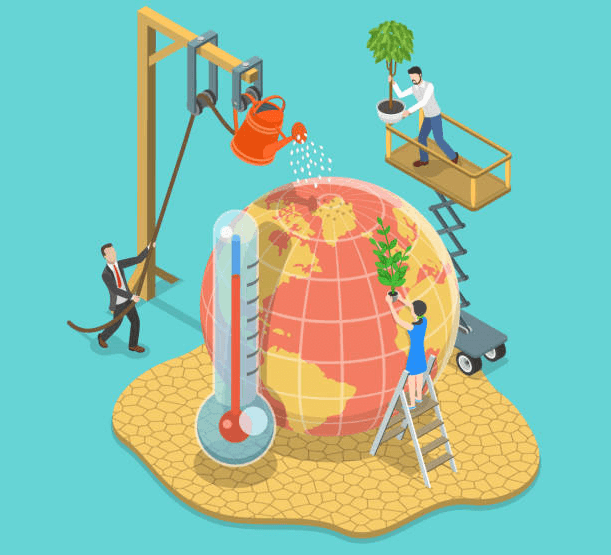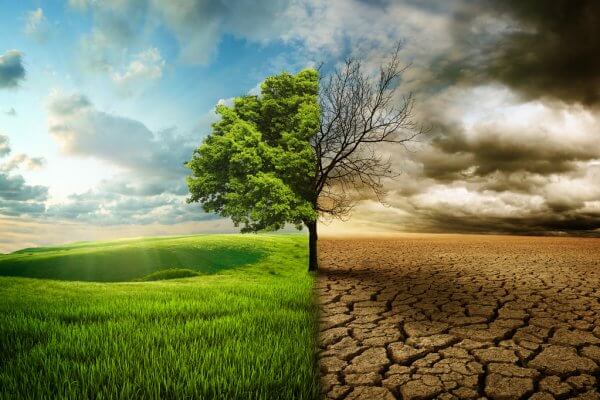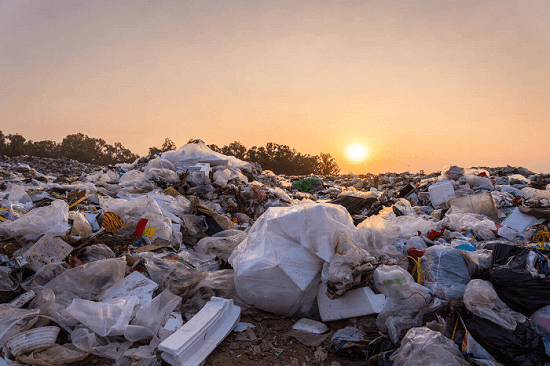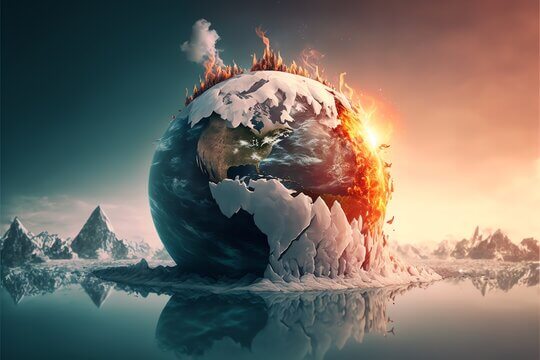Global Warming Definition Causes And EffectsA slow, long-term rise in the average global temperature of Earth's atmosphere is known as global warming. This is caused by the greenhouse effect, in which gases from different human activities, such as the burning of fossil fuels, trap solar radiation. Despite differences of view, most scientists believe that global warming is a serious issue that, if allowed unchecked, may have disastrous consequences for humanity. The primary cause of this issue is people, according to more than 99% of peer-reviewed scientific studies. 
Understanding Global WarmingGlobal warming is the term used to describe the steady rise in the earth's natural surface temperature. Although this warming phenomenon has been present for a while, over the past century, the burning of fossil fuels has significantly increased its speed. The amount of fossil fuels burnt has grown in proportion to the growth in the human population. The "greenhouse effect" resulting from the combustion of fossil fuels like oil, coal, and natural gas has an impact on the Earth's atmosphere. 
The greenhouse effect occurs when heat from the sun's rays enters the atmosphere but cannot leave when it is reflected off a surface and back into space. Gases produced by the burning of fossil fuels stop heat from escaping into the environment. These gases include chlorofluorocarbons, methane, nitrous oxide, water vapor, and carbon dioxide. The rise in average global temperature over time, often known as global warming, is a result of the extra heat in the atmosphere. Climate change is a problem brought on by global warming. Although these expressions are occasionally used interchangeably, they are not the same. The term "climate change" describes modifications to global weather patterns and crop seasons. It also refers to the increase in sea level brought on by melting glaciers and ice sheets and the expansion of warmer oceans. Due to extensive flooding and catastrophic weather, climate change brought on by global warming presents a major danger to life on Earth. Scientists are still researching global warming and how it affects the planet. Causes Of Global WarmingEmissions of greenhouse gases coat the whole planet, trapping solar heat. As a result, the climate is shifting and warming. Now, global warming is occurring at its fastest rate ever.
The production of electricity and heat from fossil fuels like coal, oil, and natural gas is responsible for a large amount of the emissions that are contributing to global warming. Just around a quarter of the power is still generated using renewable energy sources like wind and solar. Much of it is still made with fossil fuels. Cities significantly contribute to climate change. According to UN Habitat, cities use 78% of the energy produced worldwide and produce more than 60% of the world's greenhouse gas emissions. Nonetheless, they make up less than 2% of the Earth's surface. Poor and low-income communities are more vulnerable to the effects of climate change, in part because many of them live on the margins of society, in unstable buildings, and in areas that are more prone to flooding, landslides, and earthquakes, but also because they lack the resources, emergency response systems, and capacity to deal with such events. In underdeveloped nations, this is much more noticeable.
Fossil fuels are primarily responsible for emissions from manufacturing and industry, which are used to produce goods like textiles, electronics, plastics, cement, iron, and steel. Also, during industrial processes like mining, gases are emitted. The triple planetary problems of pollution, biodiversity loss, and climate change are all the result of unsustainable patterns of production and consumption. The sustainability of the development goals as well as human well-being are threatened by these crises and the resulting environmental deterioration. To increase waste reduction, lessen pollution, and create a new circular economy, governments and all individuals should collaborate. Governments invested $375 billion in subsidies and other forms of assistance for fossil fuels in 2020. Almost 90% of nations claim that curriculum, teacher preparation programs, national education laws and policies, and student evaluations in primary and secondary schools all include at least some elements of learning about sustainable development and global citizenship.
As forests are removed to make space for farms, pastures, or any other uses, emissions rise because the carbon that the trees have been absorbing is released. When trees absorb carbon dioxide, their potential to block emissions from the atmosphere is diminished by their destruction. We don't frequently identify woodlands with activities like consuming water, keeping a journal, taking a fever-reducing medication, or constructing a home. But, each of these and a host of other aspects of our life are somehow related to forests. 
Sustainable resource use and forest management are crucial for combating climate change and ensuring the prosperity and welfare of both the present and the future generations. Forests are furthermore crucial for eradicating poverty and fulfilling the Sustainable Development Goals (SDGs). Despite these immeasurable ecological, economic, social, and health advantages, forests are nevertheless under peril due to fires, pests, droughts, and increasing deforestation.
Fossil fuels are often used to power vehicles, trucks, ships, and aircraft. As a result, emissions of greenhouse gases, particularly carbon dioxide, are greatly influenced by the transportation sector. The majority of emissions come from road vehicles, although emission levels from ships and airplanes are also increasing. Our daily lives are fuelled by electricity. Although 750 million people worldwide continue to lack the access to electricity, for the remainder, power is required for devices like computers, televisions, and refrigerators. The greatest source of greenhouse gas emissions in the world, accounting for around 35% of all emissions, is the energy supply sector, which includes electricity, heat, as well as other energy. Almost half of the power used worldwide is consumed by residential and commercial structures. It's important to phase out fossil fuels for home heating, for instance by prohibiting the development of new gas-fired boilers and introducing electric heat pumps.
Energy is needed to power farming machinery or fishing boats, which is often done using fossil fuels. While utilizing fertilizers and manure to grow crops, for example, emissions might occur. Methane, a potent greenhouse gas, is produced by cattle. Moreover, food distribution and packaging also produce pollutants. The globe currently heavily depends on the fish business since fish is one of the primary sources of protein for people. There is currently less marine life since fewer people are buying and eating fish. Lack of diversity in the ocean has been brought on by overfishing.
Due to the extensive use of packaging and the condensed lifespan of goods, humans produce more garbage than ever before. Many products, garbage, and packaging can't be recycled; therefore, they end up in landfills. Global warming-causing gases are released into the atmosphere when garbage in landfills starts to degrade or break down. 
Effects of Global WarmingAcross the world, there are signs of and perceptions of the impacts of global warming. Human activity-most notably the combustion of fossil fuels, which releases greenhouse gases like carbon dioxide (CO2) and methane into the atmosphere-is the primary cause of global warming, the steady heating of the Earth's surface, seas, and atmosphere. 1. Rise TemperatureOne of the most visible and obvious results of global warming is the increase in average world temperatures. The average worldwide temperature has risen by around 1.4 degrees Fahrenheit (0.8 degrees Celsius) over the previous 100 years, according to the National Oceanic and Atmospheric Administration (NOAA). The increase in global average temperatures is causing changes in weather patterns. Global warming directly contributes to extreme weather. There are many distinct varieties of these extremes. Contrarily, certain regions may experience colder winters as a result of climate change. Climate changes can cause the polar jet stream, which separates warm equatorial air from chilly North Pole air, to move south and bring cold Arctic air with it. 
2. Sea Levels RisingPolar areas are more susceptible to an atmospheric warming. The Arctic is seeing a twofold increase in global average temperatures than the rest of the planet, and the ice sheets are melting quickly. Along with having negative effects on the local populace, fauna, and flora, this might also have detrimental effects on sea levels, which could be the most catastrophic one. Our oceans are predicted to rise one to four feet by 2100, posing a threat to coastal systems and low-lying places, including entire island nations, major cities like Mumbai, Rio de Janeiro, and Sydney, Australia, as well as Los Angeles, Miami, and New York City. 
3. Polluted AirWhen temperatures rise, more ground-level ozone smog is produced as a result of the reaction of pollution from factories, vehicles, and other sources with sunshine and heat. This smog worsens air pollution by causing it to be more prevalent. The major cause of smog is ground-level ozone, which is more prevalent as the weather gets hotter. Asthma patients are more likely to die and have greater hospital admission rates when there is dirtier air. Those who have heart or pulmonary illness suffer from worsening health as a result. Also, higher temperatures greatly increase the amount of airborne pollen, which is terrible news for people who have hay fever and other allergies. 4. Higher Wildlife Extinction RateAlthough we humans deal with many difficulties, we are by no means the only ones who experience pressure. Animals living on land and in the sea must adapt swiftly or they will be wiped out as the land and the sea change rapidly. Some won't, while others will succeed. Invertebrates (particularly pollinators) and flowering plants are some of the most susceptible species, according to the Sixth Assessment Report of the International Panel on Climate Change, which shows that the danger of species extinction rises sharply with increases in the global temperature. However, a 2015 research found that human-caused climate change, pollution, and deforestation are responsible for the extinction of vertebrate species, which include fish, birds, mammals, amphibians, and reptiles. These species are becoming extinct more than 100 times faster than that of the natural rate of extinction. 
5. Acidifying SeaClimate change is putting stress on the marine ecosystems of the planet. Ocean acidification is increasing in significant part as a result of the oceans' absorption of certain amounts of our excess emissions. Underwater life is seriously threatened when this acidification picks up speed, especially organisms with calcium carbonate skeletons or shells like corals, crabs, and mollusks. The shellfisheries may be greatly impacted by this. The effects of ocean acidification might cost the U.S. shellfish sector more than $400 million yearly by 2100 To Wrap Things UpThe temperature of our globe is rising. Temperatures are rising and severe weather is happening more frequently as a result of global warming. 
Future generations will experience more intense weather, higher sea levels, greater temperatures, crop failures, extinctions, and other negative outcomes if we don't start taking precautionary measures now. By cutting back on overall energy usage, lowering greenhouse gas emissions, and switching from fossil fuels, one may lessen the effects of global warming. Even better, start a campaign to promote sustainable energy sources and tree plantation around your community. As solar energy doesn't emit any greenhouse emissions, it's one of the greenest and most sustainable methods to power your home. The additional benefit of lowering your utility costs is another advantage of installing solar panels on your house.
Next TopicHIV Definition
|
 For Videos Join Our Youtube Channel: Join Now
For Videos Join Our Youtube Channel: Join Now
Feedback
- Send your Feedback to [email protected]
Help Others, Please Share










